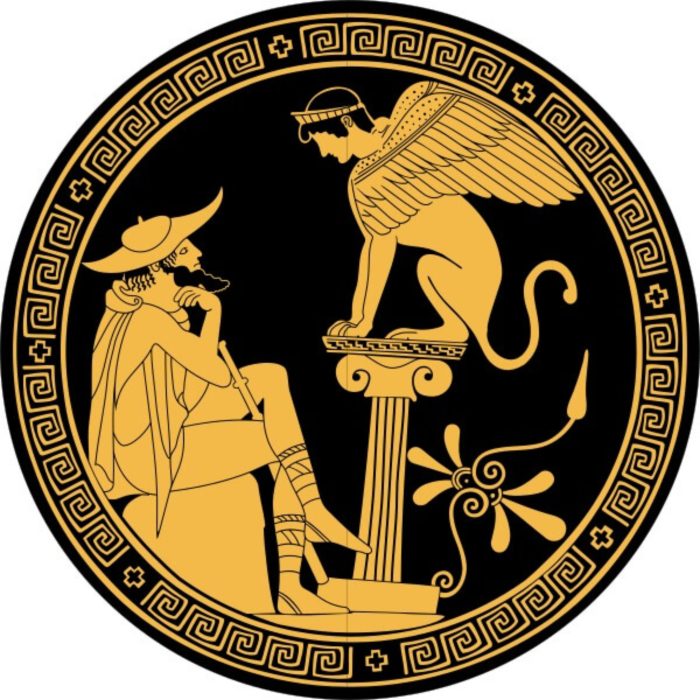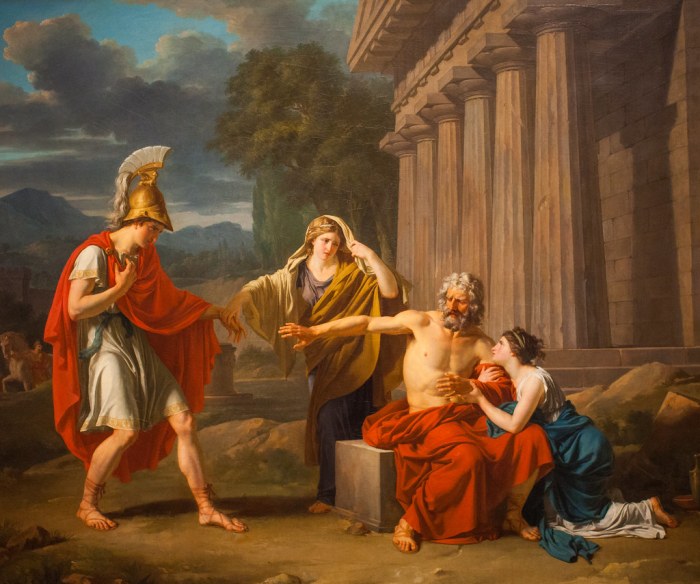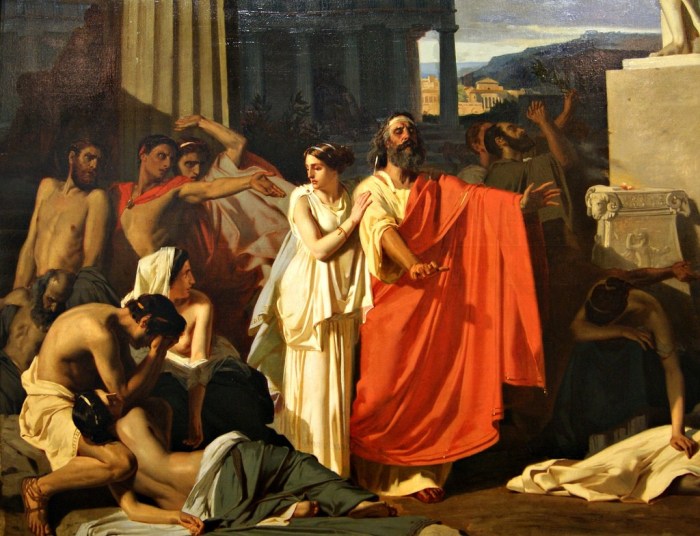Jocasta’s son and husband crossword delves into the intricate family history of Greek mythology, unraveling the enigmatic relationships between Jocasta, Oedipus, and Laius. This crossword puzzle challenges solvers to decipher the connections within this tragic lineage, inviting them to explore the depths of human destiny and the complexities of fate.
The crossword’s clues lead solvers through a labyrinth of names and events, revealing the prophecy that haunted Oedipus from birth and the tragic consequences that unfolded as it was fulfilled. Along the way, solvers encounter the pivotal role played by Jocasta, whose knowledge and involvement in the events leading to Oedipus’s downfall remain shrouded in mystery.
Jocasta’s Family

Jocasta, a prominent figure in Greek mythology, was born into a royal lineage and became the queen of Thebes. Her family relationships played a pivotal role in the tragic events that unfolded in the Oedipus myth.
Jocasta’s father was Menoeceus, the king of Thebes. Her mother’s identity is uncertain, but some sources suggest she was either Eurydice or Creon’s sister, Henioche.
Jocasta’s Marriage to Laius
Jocasta was first married to Laius, the former king of Thebes. Laius and Jocasta had a son, Oedipus, who was destined to kill his father and marry his mother, according to a prophecy. Fearing the prophecy, Laius ordered Oedipus to be killed, but the infant was saved and eventually found his way to Thebes.
Jocasta’s Marriage to Oedipus
Years later, Oedipus unknowingly killed Laius at a crossroads and solved the riddle of the Sphinx, earning him the throne of Thebes. He then married Jocasta, unaware that she was his biological mother.
The truth about Oedipus’s parentage was eventually revealed, leading to his downfall and Jocasta’s suicide. The tragic consequences of their relationship serve as a cautionary tale about the dangers of defying fate and the power of destiny.
Jocasta’s Family Tree
The following family tree illustrates Jocasta’s lineage:
- Menoeceus (father)
- Eurydice or Henioche (mother)
- Jocasta (daughter)
- Laius (first husband)
- Oedipus (second husband and son)
This family tree highlights the complex relationships within Jocasta’s family and the tragic events that resulted from their intertwined destinies.
Oedipus’s Fate
Oedipus, the central figure of Sophocles’ tragedy, is destined to suffer a tragic fate from the moment of his birth. An oracle prophesizes that he will kill his father and marry his mother, leading to his parents’ banishment of him as an infant.
Unbeknownst to Oedipus, he fulfills the prophecy unknowingly. He kills a man at a crossroads, who turns out to be his father, Laius, and later marries the widowed queen, Jocasta, who is his mother. The truth is eventually revealed, leading to Jocasta’s suicide and Oedipus blinding himself in anguish.
Impact of the Prophecy
The prophecy surrounding Oedipus’s birth has a profound impact on his life, shaping his actions and ultimately leading to his downfall. His parents’ desperate attempt to prevent the prophecy by abandoning him only sets the stage for its fulfillment. Oedipus’s tragic fate highlights the futility of trying to escape one’s destiny and the devastating consequences of ignorance.
Fulfillment of the Prophecy
The fulfillment of the prophecy is a complex and tragic process. Oedipus’s unwitting actions, driven by his desire for truth and justice, ironically lead him to commit the very crimes he sought to avoid. The events unfold with a sense of inevitability, as if fate itself is conspiring against him.
Oedipus’s tragic fate serves as a cautionary tale about the dangers of hubris and the importance of self-knowledge. It explores the themes of free will versus destiny, the consequences of ignorance, and the search for truth, even in the face of overwhelming odds.
Jocasta’s Role in the Tragedy
Jocasta, the wife of Oedipus and the former queen of Thebes, plays a pivotal role in the tragic events that unfold in Sophocles’ masterpiece, Oedipus Rex. Her actions and knowledge significantly contribute to the unraveling of Oedipus’s fate and the subsequent downfall of the royal family.
Jocasta’s Knowledge and Involvement
Jocasta initially appears as a concerned and supportive wife, unaware of the terrible truth that binds her to Oedipus. However, as the play progresses, her involvement in the tragic events becomes evident.
- Knowledge of the Oracle’s Prophecy:Jocasta is aware of the prophecy that her son would kill his father and marry his mother. This knowledge weighs heavily on her mind, and she attempts to conceal it from Oedipus.
- Witness to Laius’s Murder:Jocasta was present when her husband, King Laius, was murdered. However, she provides conflicting accounts of the incident, leading to suspicions about her involvement.
- Facilitation of Oedipus’s Investigation:Jocasta actively encourages Oedipus to investigate the murder of Laius, unaware that it will ultimately lead to the revelation of his own crimes.
Jocasta’s Motivations and Actions
Jocasta’s motivations are complex and often driven by her desire to protect her family and her reputation. Her actions, however, ultimately contribute to the tragic outcome.
- Fear of Prophecy:Jocasta’s fear of the prophecy drives her to conceal the truth from Oedipus and to prevent him from investigating Laius’s murder.
- Desire to Preserve the Throne:As queen, Jocasta is concerned about the stability of Thebes and her own position. She fears that Oedipus’s actions could lead to chaos and the loss of her power.
- Self-Deception:Jocasta refuses to accept the truth about Oedipus’s crimes. Her denial leads her to dismiss evidence and to accuse others of wrongdoing.
Thematic Exploration: Jocasta’s Son And Husband Crossword

The story of Jocasta and Oedipus explores profound themes that resonate with human experiences and dilemmas. These themes include:
Fate and Free Will
The tragedy of Jocasta and Oedipus highlights the tension between fate and free will. Oedipus’s destiny is foretold by an oracle, but he struggles against it, believing he can control his own fate. His actions, however, ultimately fulfill the prophecy, raising questions about the extent to which our lives are predetermined or shaped by our own choices.
Knowledge and Ignorance
Jocasta and Oedipus’s tragic downfall stems from their ignorance of the truth. They are unaware of their familial connection and the horrors that have befallen them. Their pursuit of knowledge ultimately leads to their destruction, underscoring the dangers of both excessive knowledge and willful ignorance.
The Role of Suffering, Jocasta’s son and husband crossword
The story of Jocasta and Oedipus is a testament to the transformative power of suffering. Through their experiences, they undergo profound personal growth and redemption. Their suffering ultimately leads to a deeper understanding of themselves and their place in the world.
The Nature of Tragedy
The story of Jocasta and Oedipus is a classic tragedy that explores the human condition. It portrays the inevitability of fate, the consequences of human folly, and the power of suffering to shape and ultimately redeem us.
Cultural and Historical Context

The Oedipus myth emerged in ancient Greece during the Archaic period, around the 7th century BCE. It is deeply rooted in the cultural and historical context of that era, reflecting the values, beliefs, and social structures of the time.
One significant aspect of the cultural context is the prevalence of oracles and prophecies in ancient Greek society. The oracle at Delphi played a pivotal role in the myth, as it foretold Oedipus’s destiny to kill his father and marry his mother.
This belief in divine guidance and fate heavily influenced the characters’ actions and the unfolding of the story.
Social Structure
The social structure of ancient Greece also played a significant role in shaping the myth. Oedipus’s status as a prince and the emphasis on lineage and inheritance reflect the importance of social hierarchy and family ties in Greek society. The myth explores the consequences of defying social norms and the tragic outcomes that can result from disrupting the established order.
Clarifying Questions
Who was Jocasta’s son?
Oedipus
Who was Jocasta’s husband?
Laius
What was the prophecy surrounding Oedipus’s birth?
That he would kill his father and marry his mother